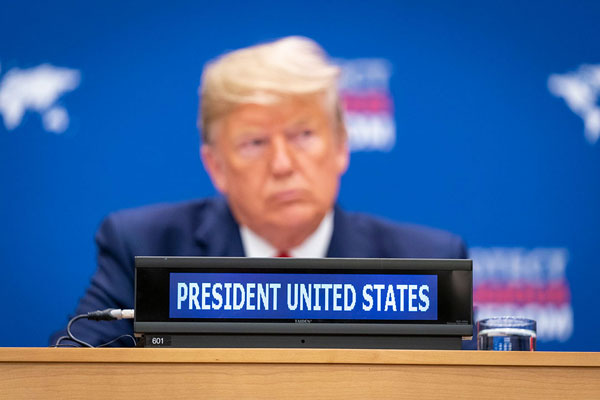U.S. Universities warn international students to return to the U.S. before Trump’s inauguration

[An image of President Elect Donald J. Trump aligned with a sign, Photo credit: Rawpixel]
Several U.S. colleges and universities have urged their international students to return to campus before U.S. president-elect Donald J. Trump’s inauguration on January 20, 2025, amid concerns over potential immigration policy changes.
Former U.S. president and soon-to-be president-elect Donald J. Trump has a documented history with mass deportation policies.
During his first term as the 45th president of the United States, Trump implemented a travel ban that impacted thousands of people around the world.
The executive order, issued in January 2017, banned travel to the U.S. by citizens of seven majority-Muslim countries: Iran, Iraq, Libya, Somalia, Sudan, Syria, and Yemen.
Trump later modified the list of countries, ultimately affecting citizens of 15 nations throughout his former presidency.
The travel ban remained in effect until 46th U.S. President Joe Biden rescinded it upon taking office in 2021.
Throughout his campaign to become the 47th president, Trump has repeatedly pledged to mass deportation efforts.
Trump has specifically targeted international students, explicitly stating “to revoke the student visas of radical anti-American and antisemitic foreigners at our [U.S.] colleges and universities” in response to campus protests.
The former president has also discussed the revival of the travel ban and its expansion, declaring that “We aren’t bringing in anyone from Gaza, Syria, Somalia, Yemen or Libya or anywhere else that threatens our security” at an October 2023 campaign event in Iowa.
According to Open Doors, a data project funded by the U.S. State Department, U.S. colleges have enrolled more than a record 1.1 million international students in the 2023-2024 academic year.
Students from India and China comprise more than half of all international students, while about 4% come from the 15 countries that were affected by Trump’s travel restrictions.
Cornell’s Office of Global Learning issued a warning to students on their website in late November, specifically mentioning citizens of countries targeted in Trump’s first administration: Iran, Kyrgyzstan, Libya, Myanmar, Nigeria, North Korea, Somalia, Sudan, Syria, Tanzania, Venezuela, and Yemen.
The office further noted that new countries could be added to the list, particularly China and India.
To avoid any potential difficulty in re-entering the country, universities are advising students to be physically present in the U.S. by January 19th until uncertainties around Trump’s immigration policy plans become clear.
Schools are also recommending that international students carry additional documentation of their connection to their American college as a precautionary measure.
Among the institutions that have issued such warnings are Brown University, Cornell University, Columbia University, Haverford College, Johns Hopkins University, Massachusetts Institute of Technology, Northeastern University, Princeton University, Quinnipiac University, The New School, University of Connecticut, University of Massachusetts Amherst, University of Pennsylvania, University of Southern California, Wesleyan University, and Yale University.
New York University, where Donald Trump’s son Barron currently attends, has not issued any guidance, despite hosting the largest number of international students with 27,200 students.
Other schools have chosen to advise students to plan ahead and prepare for delays, rather than warning of a likely ban.

- Ethan Chung / Grade 10
- The Peddie School

![THE HERALD STUDENT REPORTERS [US]](/assets/images/logo_student_us.png)
![THE HERALD STUDENT REPORTERS [Canada]](/assets/images/logo_student_ca.png)
